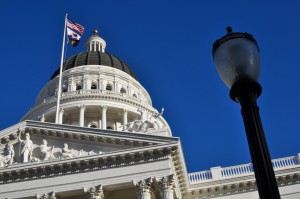(A previous version of this post ran in September. This version has been updated with new information.)
Gov. Jerry Brown has been busy over these past few weeks signing dozens bills into new state laws. They include several related to education funding, student health and welfare, and charter school operations.
 Here’s a sample of some of the laws already signed by the governor so far that could impact our local schools.
Here’s a sample of some of the laws already signed by the governor so far that could impact our local schools.
Assembly Bill 1248, students wearing religious, ceremonial, or cultural adornments at school graduation ceremonies: This Law will declare that a student has the right to wear religious, ceremonial, or cultural adornments, as defined, at school graduation ceremonies. The law will also declare that nothing in its provisions would limit a school or district from prohibiting an item that is likely to cause a substantial disruption of, or interference with, the ceremony.
AB 3205, classroom door locks: This law requires that any school modernization project done with money from the state’s school facility bond program include locks that allow doors to classrooms and any room with an occupancy of five or more people to be locked from the inside.
AB 2657, limiting restraint and seclusion: Teachers and district personnel assigned to serve students with disabilities will be restricted in the use of physical or mechanical restraint and seclusion on their students, under this new law.
AB 1871, free and reduced priced meals at charters: As of next fall, all charter schools must serve nutritious meals as well under the new law. More than half of the state’s 680,000 charter school students would qualify for the program.
AB 1974, uncollected meal debts: This new law forbids districts from withholding transcripts or diplomas from students for unpaid debts for student meals, and bill collectors from reporting unpaid parents’ payments to credit agencies.
Senate Bill 830, media literacy/fake news awareness. The law calls for the California Department of Education to make available to school districts on its website a list of resources and instructional materials on media literacy, including professional development programs for teachers.
AB 2601, sex education in charter schools. Beginning with the 2019–20 school year, all charter schools must be in compliance with the California Healthy Youth Act, which requires that public schools teach “medically accurate” and “age appropriate” comprehensive sex education at least once in middle school and once in high school. Until now, charters have been exempt from following this law.
AB 406, for-profit charter school operators: This law, on and after July 1, 2019, will prohibit a charter petition for the establishment of a charter school or the renewal of a charter school that’s operated by a for-profit corporation, a for-profit educational management organization, or a for-profit charter management organization.
AB 2735, English learners in standard instruction classes: This law, commencing with the 2019-20 school year, will prohibit middle school or high school students who are classified as an English learners from being denied participation in a school’s standard instructional program, including courses required for graduation and college admission.
AB 1798, school bus seat belts: This law will require that, on or before July 1, 2035, all school buses in use in California be equipped with a passenger restraint system. Because a violation of the bill’s requirements would be a crime, the bill would impose a state-mandated local program.
AB 2639 and SB 972, suicide prevention support: These two laws will require schools that serve students in grades 7 through 12 to review and, if necessary, update their policy on pupil suicide prevention at least every five years. They will also require schools that serve students in any of grades 7-12 and institutions of higher education that issue student identification cards to have printed — on either side of the identification card — the number for the National Suicide Prevention Lifeline, 1-800-273-8255.
AB 1868, sexual health and social media: This law will authorize a school district to provide optional instruction, as part of comprehensive sexual health education and HIV prevention education, regarding the potential risks and consequences of creating and sharing sexually suggestive or sexually explicit materials through cell phones, social networking sites, computer networks or other digital media.
We’ll continue tracking some of the more impactful education legislation as it makes its way across the governor’s desk, so keep checking OCDE Newsroom regularly.
